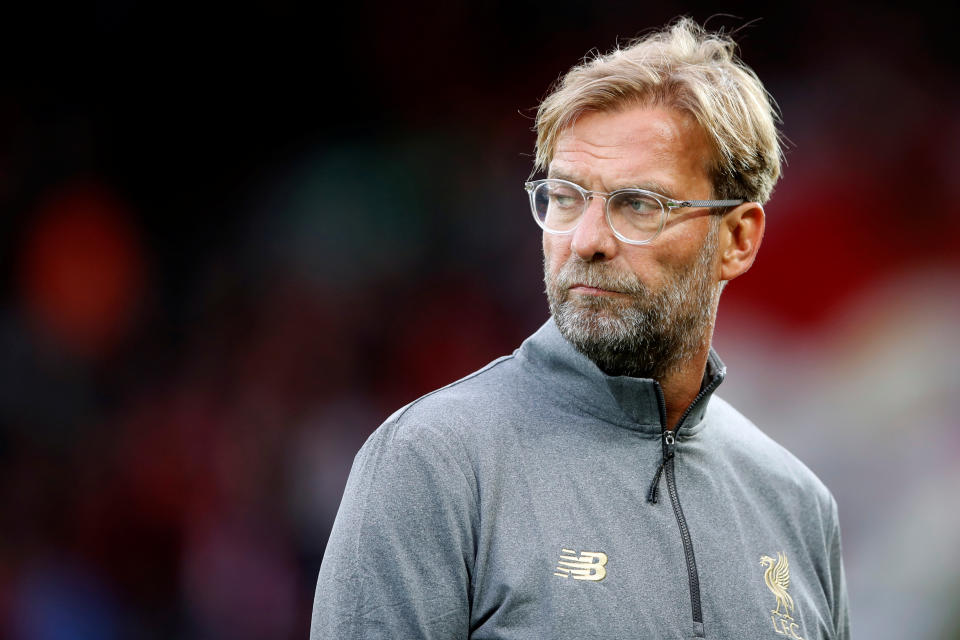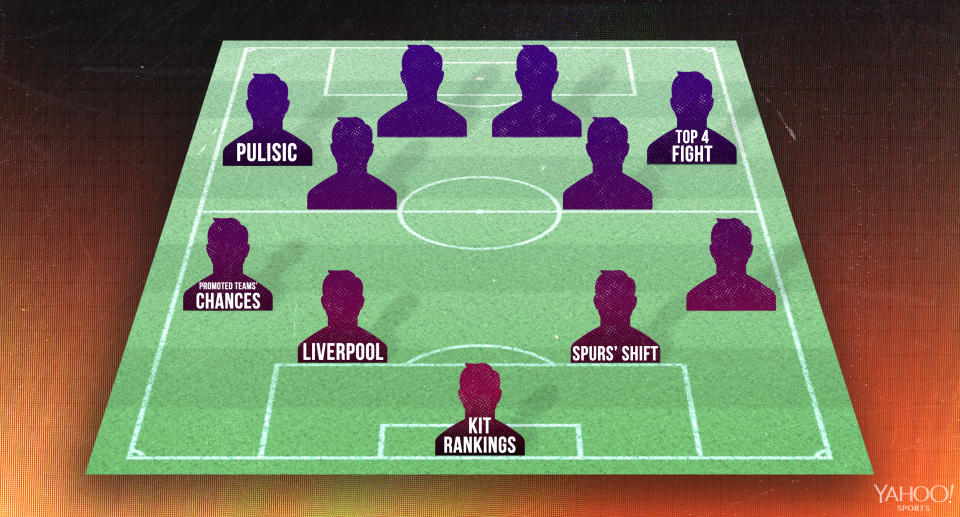Premier League preview: Why Liverpool's quest is now accompanied by unspoken mortality

Welcome to Yahoo Soccer’s Premier League Starting XI. This lineup of stories will get you ready for the upcoming season as we count down to kickoff on Friday.
The greatest Liverpool season in the 27-year history of planet earth’s most popular sporting circuit ended, on a beaming Anfield afternoon this past May, with applause.
With smiles and song, too. With thousands of “Allezs” and widespread appreciation and buoyant optimism. Optimism that 97 points and one loss were not only remarkable achievements, but signs of things to come.
A ninth consecutive Premier League win had topped off the third-best campaign in English top-flight history. A Champions League title three weekends later cemented Liverpool as a club reborn. One that had fused money and progressive thinking with unrivaled emotion to intoxicating effect. The 2018-19 season was one to remember. It was proof of concept. It was vindication for investment and love.
Yet it ended, for the 27th time in 27 tries, without the piece of silverware the Kop covets most.
On one hand, it fueled hope. After all, 1.6 inches were the margin. Manchester City’s historic stretch run was the culprit. Liverpool, with an attacking trident, omnipotent defender and difference-making goalkeeper peaking in unison, appears primed for perennial contendership. The entire supporting cast is intact. The backroom infrastructure, on both the business and footballing sides, is in place. A maniacal German mastermind is at the helm, and has Reds from L4 to the 10001 believing.
On one hand, in other words, this could be the year.

But on the other, last year could have been the year. It wasn’t. Instead, it was another opportunity squandered. Liverpool got 38, 38, 38, 36 and 34 games from its five stars; two nonsensical 90-plus-minute winners; a crucial missed penalty from an opponent, more late magic from unlikely sources, and hefty Expected Goal overperformance. It still couldn’t end its Premier League drought.
On Friday, minutes before the league starts anew, for the umpteenth time, Liverpool supporters will fill Anfield and sing about hope. About maintaining it through stormy wind and rain. They’ll convince themselves and one another that the drought could soon end.
But a sobering reality lingers: It might not end. It might never end. Because 2018-19 wasn’t just Liverpool’s latest opportunity; it may very well have been the last.
The Super League context
The concept of “Premier League history” has always been a somewhat artificial one. The league opened in 1992 – some 103 years after Preston North End won the inaugural Football League. On the surface, the EPL’s launch amounted to a rebrand. Competitively, it was no different than the First Division it replaced. So belaboring the fact that Liverpool has never won it is at best deceiving, and at worst illogical, historically irresponsible and unfair. As recently as 2009, Liverpool’s 18 top-flight crowns sat atop England’s all-time ledger.
The formation of the Premier League, however, is symbolic. It was both a fractious beginning and an instructive precursor. It brought big money into soccer, and foretold of more on the way. On the surface, it didn’t really give English football a makeover. But it established the foundation on which the global behemoth that is modern soccer has been built, and the bridge that could enable English football’s destruction. A brief history lesson will explain.
The formation of the Premier League, you see, was about TV revenue – just as so much of the sport’s growth and realignment over the past half century has been. English soccer’s first TV contract, worth about $6,073 in the 1960s, was split evenly among the Football League’s 92 clubs, which constituted a four-league pyramid with the first division at the top. (That’s roughly $66 per club, or 0.0000004 of what Liverpool made in Premier League TV money last year.)
The guiding principle was competitive balance. But pretty soon, the country’s most successful clubs realized they were worth more to the league than their revenue shares suggested. They began pushing for larger pieces of the pie, and got exactly that in the mid-1980s: 50 percent of TV money would go to the first division, 25 percent to the second division, and 25 to the third and fourth tiers.
Still, though, their threat of a breakaway “super league” loomed. In 1990, months after Liverpool clinched its 18th First Division title, an LFC executive joined representatives from Manchester United, Arsenal, Tottenham and Everton for a momentous meeting with powerful TV exec Greg Dyke. The idea for a breakaway Premiership, which would sell its own TV rights and distribute almost all revenue among its 18-22 members, crystalized. In 1992, despite controversy, the new league was born.
Now, 27 years of globalization later, an eerily similar battle is brewing. The “Big Six” – which includes the same clubs as that 1990 meeting, minus Everton and plus Manchester City and Chelsea – recognize that the Premier League’s commercial might is utterly dependent on them. They have fought for, and won, more substantial revenue shares. All the while, they’ve been scheming. Last fall, Der Spiegel’s Football Leaks investigation revealed that five of them were in discussions to form a breakaway European Super League. Under the plan, they’d withdraw from the Prem, detonating its prestige and ending English football as we know it.

Their proposed 2021 start date is overly ambitious. But market forces are pushing soccer in this direction. Equitable domestic revenue sharing amid international competition is fundamentally unsustainable. Elite clubs are pulling away from inferior peers anyway, both on fields and bottom lines. It is only a matter of time before they codify the stratification and pull away for good, into their own Super League, with its own blank record book.
And it is only a matter of time, therefore, before the EPL’s closes. The league with the artificial starting point will have a defined, legitimate endpoint. For the fans who dream of the day they sit atop it, who crave it more than even the Champions League, hope’s clock is ticking.
The mortality and urgency of Liverpool’s title chase
There is no modern sporting parallel. No league that puts timelines on harrowing quests. Barring something unforeseeable, the NBA will never cease to exist. Title chases in Atlanta, Utah, Brooklyn, Denver and elsewhere will go on.
Most sports fandom, at least within a lifetime, is immortal. Although a generation of Chicago Cubs fans never witnessed a championship, the pursuit was infinite. The curse, eventually, was going to be broken, unless the planet melted first. Steve Bartman, eventually, would be able to roam free, just like the Philadelphia Eagles, eventually, would vanquish ghosts of Super Bowl and playoff losses past, and just like the Detroit Lions and Minnesota Vikings eventually will.
Over on Merseyside, though, there may soon be a deadline. A finite window. Mortality. And frightening thoughts.
Liverpool has come so close. So desperately close, only to be scarred, whether by Gerrard’s slip or Palace’s comeback or City’s otherworldliness. Until rumblings of a Super League were exposed as real, there was an implicit understanding that someday those scars would heal. That the anguish that has built over 29 years would only strengthen an eventual cathartic release, just like it did in Philly, or before that in Chicago, or more recently in Toronto.
Now, the unspoken possibility looms: What if wounds from that 2014 Chelsea game never heal?
What if Liverpool, without two titles before a Super League intervenes, is stuck behind despised rival Man United on that all-time ledger forever?
What if the Premier League passes Liverpool by for good?
This is the context for, and urgency of, one of the most anticipated two-horse races in years – between the world’s two best teams, for a throne City currently occupies and Liverpool yearns for above all else.
The Reds are decided underdogs. But at 5/2, they have their shortest preseason title odds of the decade, perhaps of the century, and quite possibly of the Premier League era. They have Mohamed Salah, Roberto Firmino and Sadio Mane, all age 27. They have the sport’s best center back, Virgil van Dijk, and the league’s best keeper, Alisson. They have a settled Naby Keita and a fit-again Alex Oxlade-Chamberlain to infuse dynamism into midfield. They have continuity rarely seen at elite clubs.
They are ascendent. Built to stay. Anfield’s new favorite tune, Allez Allez Allez, assures anybody who’ll listen that Liverpool is “never gonna stop.” As long as Jurgen Klopp is in charge, those words will ring true.
The question is whether he and they can realize a suffering city’s dream before soccer’s power brokers step in and quash it.
– – – – – – –
Henry Bushnell is a features writer for Yahoo Sports. Have a tip? Question? Comment? Email him at henrydbushnell@gmail.com, or follow him on Twitter @HenryBushnell, and on Facebook.
Yahoo Soccer’s Premier League Starting XI



